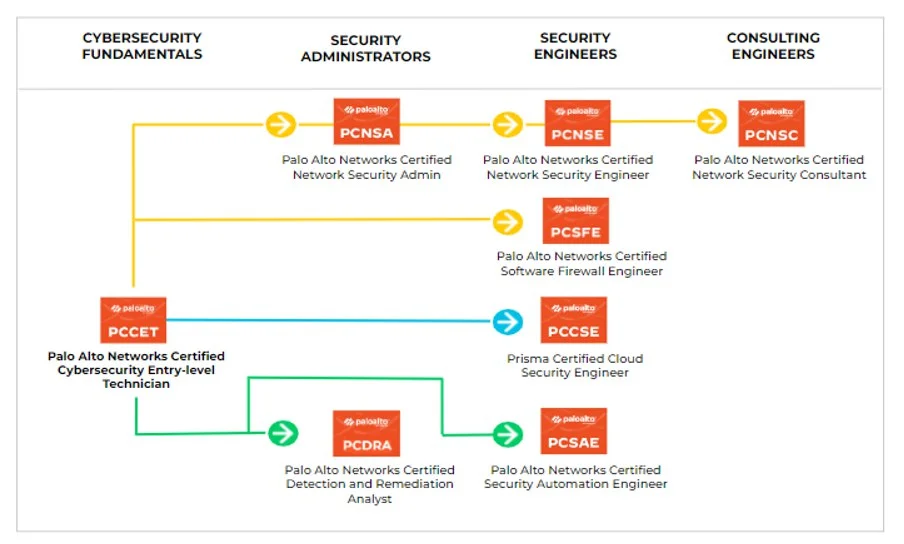Palo Alto course is designed to equip cybersecurity professionals with the knowledge and skills needed to effectively deploy, manage, and troubleshoot Palo Alto Networks security solutions. With the rise of cyber threats and attacks, organizations are placing a strong emphasis on network security.

Palo Alto Networks, as a leading provider of next-generation firewall solutions, is likely to see contributing to job opportunities in this area. Certifications, such as the Palo Alto Networks Certified Network Security Engineer (PCNSE), can enhance job prospects. Employers often look for candidates with a combination of certifications and practical experience. Employers often look for candidates with a combination of certifications and practical experience. With our virtual lab technology, you can access our lab from anywhere, at any time which helps you to gain hands-on experience. We look forward to helping you enhance your skills, advance your career, and succeed in the dynamic world of Palo Alto Networks security solutions.

No formal prerequisites, but strong basic networking and security knowledge is recommended. Hands-on experience with Palo Alto Networks products is beneficial but not mandatory.
Palo Alto Networks Security Operating Platform:
Overview of the Palo Alto Networks Security Operating Platform Core components and architecture
Firewall Configuration: Initial configuration and setup of the firewall Interface configuration Administrative roles and management
Security and NAT Policies: Understanding and configuring security policies Network Address Translation (NAT) policies Policy administration and best practices
Application Identification (App-ID): Overview of App-ID technology Identifying and controlling applications Custom App-ID creation
Content Inspection (Content-ID): Content-ID technology and features Threat prevention, antivirus, anti-spyware, and URL filtering File blocking, data filtering, and WildFire integration
User Identification (User-ID): User-ID concepts and deployment User-based security policies Integration with directories (e.g., LDAP, Active Directory)
VPN Configuration: Configuring IPsec VPN Configuring SSL VPN (GlobalProtect) Remote access and site-to-site VPN
High Availability (HA): High Availability concepts and configuration HA modes (active/active, active/passive) HA troubleshooting and failover scenarios
Logging, Reporting, and Monitoring: Logging and reporting features Monitoring traffic and system logs Using Panorama for centralized management
Troubleshooting: Basic troubleshooting techniques Understanding and using CLI commands Common issues and their resolution
Best Practices for Security: Implementing Palo Alto Networks best practices Security rule design and optimization Compliance and regulatory considerations
For detailed topics and Labs : Signup to Free LINT Account and take tour of our Student Dashboard

The candidates typically have a background in network security, IT administration, or cybersecurity. Here are the profiles of ideal candidates for this course:
Industry Recognition : The CCNA is one of the most recognized certifications in the IT industry, known for validating fundamental networking skills and knowledge.
Entry-Level Gateway to Networking : It prepares you for various entry-level networking positions, giving you the skills needed to start a career in IT networking
Career Advancement : The CCNA serves as a stepping stone to more advanced Cisco certifications, such as CCNP and CCIE.
You can also get CCNA certified with expert training in Chennai — explore our CCNA course in Chennai and take the first step toward a career in networking!
Palo Alto Networks provides next-generation firewalls and cybersecurity solutions. IT professionals, network engineers, security analysts, and those pursuing a career in network security can study Palo Alto firewall technologies.
Certification costs range from $100–$150 for the PCCSA exam to $200–$300 for the PCNSE exam. Prices may vary, so check Palo Alto Networks’ website for current fees.
It typically takes 1-6 months to prepare, depending on your experience and study method.
The passing score is usually around 70%, but it may vary by exam. Check the specific exam guide for details.
Yes, Palo Alto offers online proctoring for most certification exams.
Yes, Palo Alto firewalls are in high demand due to their advanced security features, and certified professionals are highly sought after.
Expert-Led Training
Comprehensive training solutions designed for both beginners and seasoned professionals

Your trusted partner for expert-led networking and cybersecurity education. Building the next generation of IT professionals since 2010.
